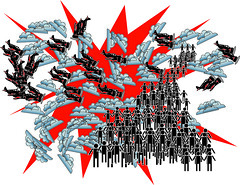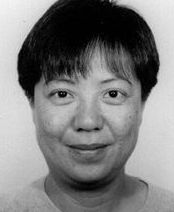
an angkor wat-looking place in Singapore! - All images in this post by J/TOHA
...how would you describe the country of your youth?
Saturday afternoon at a forum organised by The Tangent on student life and activities in the 1945-55, J and I heard Professor Koh Tai Ann from the English division of the Nanyang Technological University and (ex)journalist Mr Han Tan Juan do just that.
Held at the 16th floor of the new National Library Building, the 2 speakers spoke with their backs to an amazing panaromic view of the city- and as they spoke, one could almost imagine the buildings and landscape behind them shifting, the shoreline that moves further and further away from us.

Level 16, caught not listening to the speakers
Theirs were seemingly contrasting stories. Prof Koh would declare themselves as 2 worlds in 1 country. His was the personal, enlarged by the historical - though perhaps overwhelmed. And hers was also the personal, made to seem small by the historical - though perhaps advantaged to be on the winning side.
Though poor and living with her single mother, Prof Koh nonetheless had an "English" (read: colonial) education. An over-achiever who topped her class, wrote a stanza of her school song, won scholarships, her stories were an odd mix of self-deprecation and self-dramatisation. In that "English-educated" world, she learnt of birch trees and girl guide knots. Hers was a studious but also girlish childhood- and one, we are told, that was oblivious to the larger forces of history in the 50s. We did not hear of conflicts, emotional or historical. As colonials, I supposed you could choose to live a life a dedicated improvement.
Mr Han's, on the other hand, was all philosophy and ideals. He recounted his student activitst days in Zhong Zhen, culminating in the famous Hock Lee Bus riots and the student sit-ins. He described escaping the unbearable tear gas by jumping into the Zhong Zhen lake, and the various guises of political activity in the school.An impassioned storyteller, his was a story of conflict. His student activist days had continued into his later involvement with the Barisan Sosialis, leading to his detainment and the revoking of his citizenship in the 60s. Even till today, his story remains that of conflict - he ends his talk by appealing for the just and rightful claim of his story (and his compatriots) with that told by the "winners" (the current PAP government).
And though Prof Koh evaded the subject, she too was involved in student politics - in the 60s, she was vice-President of the University Democratic Socialist Club at the then University of Malaya. But that is another story, and a less glorious one - as one of the members of the audience (her peer at the opposing Socialist Club, the pro-Barisan Sosialis faction) reminded during the Q&A session.
[I can't do any justice to the many "sub-stories"(?) that were indirectly told that afternoon. If you are interested, you could pick up a transcript of the seminar, which The tangent usually publishes some months after their events (look for the journals at Kinokuniya's Chinese section).]

It was a coincidence that the next afternoon, J and I heard another such story.
We were with wheyface at the Arts House at Old Parliament to catch Ann Hui's 1997 documentary As Time Goes By, an intimate, slow-paced conversation not so much about the ex-colony's past, as it is about its future. Probably of the same generation as Prof Koh, Director Ann Hui gathered a handful of close friends who were also turning 50 (she is now 60) to talk about their days growing up in a country that would soon cease to be a colony.
 Mr Han spoke of a past that was still striving to assert and legitimise its place on the present and future; Prof Koh of a past that was itself a curiosity to her present audience, though strangely, not too alien. Ann Hui and her friends (1 a "company strategist" and 1 a "reluctant politician/hero") spoke with humour and a rather youthful voice spoke too about the past, but perhaps they were speaking in 1997, there was a keen awareness about HK's future - and a sense of commitment still to that future, however uncertain, and the ideas and ideals of freedom, hope - and curiosity.
Mr Han spoke of a past that was still striving to assert and legitimise its place on the present and future; Prof Koh of a past that was itself a curiosity to her present audience, though strangely, not too alien. Ann Hui and her friends (1 a "company strategist" and 1 a "reluctant politician/hero") spoke with humour and a rather youthful voice spoke too about the past, but perhaps they were speaking in 1997, there was a keen awareness about HK's future - and a sense of commitment still to that future, however uncertain, and the ideas and ideals of freedom, hope - and curiosity. In the closing sequence about why she would still remain in HK post-1997, Ann Hui said that it was because she was still curious about the country - curious about the shape its future would take.
I think that's a pretty good reason to hang on.
Comments
the tangent has a website now, i heard from someone, so the transcript may be available there quite soon.
I think that's a pretty good reason to hang on."
Does the last line epitomise your feelings towards our country? I have been asking whether it's worth hanging on indeed.
gecko - the subtitles did say "curiosity", but i think i was being flippant. at least the context in which the term was used was not so much "stand back, wait and see", as one would some freak or magic show. i think it was meant to be a curiosity because you have invested your past and love in the place - curiosity as an expression of a relationship, a desire to see it continue, a concern for the outcome of your emotional investments. still i think curiosity is apt (as opposed to "concern"), because curiosity captures some playfulness and an open-ness. it abstains from present judgement.
i think in writers and directors i admire, they or their works have this quality - whole heart in, but with the head/eyes looking both from within and from without. a loving distance, this curiosity.
so, to be vain, yes, i hope it epitomises my feelings towards this country! :> what's yours?
mine?... I am still ambivalent... akin to what you described - a flux of love and hate.
I guess it was to be expected that there was little mention of the minority races - there had been a conscious effort on the part of the British to institute 'race' as a method of governance. Thus I can understand why much of the discussion centred around the majority race - although even within that context, there were different sublayers, e.g. those from differing class.
Now, my question is, if you (as part of the majority) could ask yourselves whether it is worth hanging on here, what would you think those from the minority would think?
Anyway, I guess your question is rhetorical? :>
Maybe I am naive and have bought into the govt-speak. but the truth is that I associate less with my race than with my nationlity (is this, also, a result of my being of the majority race?). And unlike gecko, I don't think I am ambivalent about "hanging on" or questioned the "worth" of doing so.
I was just thinking that this is why art, literature, film and stories are important. Because through them, there is the possibility of curiosity and empathy - however different or similar we may be. And because it always starts with the personal/individual's story (his/her loves, sorrows, memories, race, culture,income, sexuality,religion, family, sexuality etc), before the national is even ventured?